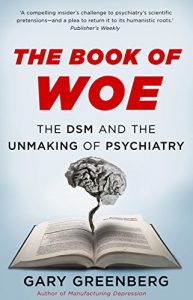A riveting exposé of the psychiatric profession’s bible from leading psychotherapist Gary Greenberg, The Book of Woe reveals the deeply flawed process by which mental disorders are invented and uninvented — and how suffering has been turned into a commodity.
Since its first edition in 1952, the Diagnostic and Statistical Manual of Mental Disorders (DSM) has been regarded as the leading authority on mental-health diagnosis and research. Over the DSM’s various iterations, however, debate has raged over which psychological problems constitute mental illness: homosexuality, for instance, was a mental illness until 1973; and Asperger’s gained recognition in 1994 only to see its status challenged nearly twenty years later.
By examining the history of the DSM and the controversies over its latest revisions, Greenberg challenges the status quo of modern psychiatric practice. He shows how difficult it is — even impossible — to rigorously differentiate mental illness from everyday suffering; and sheds light on how the politics behind mental-health classification has caused diagnosis rates of autism, attention-deficit hyperactivity disorder, and bipolar disorder to skyrocket.
Drawing on interviews with people on all sides of the debate, on historical examples, and on case studies from his own practice, Greenberg ultimately argues for a more humanistic approach to psychiatry. A combination of lively reportage and biting analysis, The Book of Woe will prove invaluable for expert and casual readers alike.








